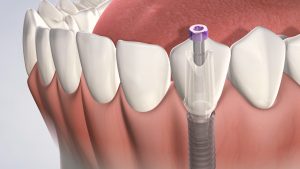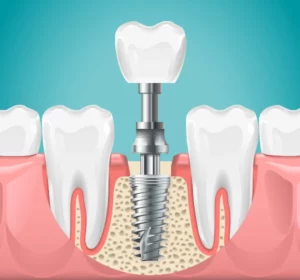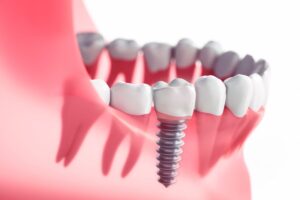Imagine biting into a crisp apple without any discomfort or hesitation, despite having lost a tooth in the past. Thanks to dental implant crowns, this dream can become a reality for many individuals who have experienced tooth loss. Dental implant crowns not only restore the appearance of your smile but also help regain the full functionality of your teeth. In this blog post, we’ll explore the different types of dental implant crowns, their attachment methods, aesthetics, functionality, and how to properly care for them.
Key Takeaways
- Dental implant crowns are aesthetically pleasing, functional replacements for missing teeth that come in various materials with their own advantages and disadvantages.
- Selection of dental implant crowns should take into account aesthetics, functionality and durability to provide a natural look with optimal bite strength.
- Proper care includes regular brushing/flossing, avoiding sugary/acidic foods and attending twice yearly checkups & cleanings.
Understanding Dental Implant Crowns
Dental implant crowns, also known as artificial tooth replacements, are designed to replace missing teeth and are attached to dental implants, which are surgically placed into the jawbone to replace lost tooth roots. These implant crowns are composed of three parts: the implant, the abutment, and the crown, which can be made from various materials like zirconia or porcelain-fused-to-metal (PFM).
Aesthetically pleasing and functional, dental implant crowns mimic the appearance and functionality of natural teeth, just like implant supported dentures and dental crowns.
Dental Implants and Their Role in Tooth Replacement
Acting as a prosthetic for the tooth root, dental implants lay the foundation for implant crowns. These small titanium posts are surgically embedded into the jawbone to replace missing teeth. With a robust and secure base, dental implants offer an effective tooth replacement solution that prevents jawbone tissue loss and provides a natural appearance and feel.
However, potential risks associated with dental implants include infection, nerve damage, and sinus complications.
Types of Dental Implant Crowns
Materials such as zirconia, porcelain-fused-to-metal (PFM), Emax, gold, and acrylic or composite resin are used to fabricate implant crowns. Each material has its own set of advantages and disadvantages. For instance, zirconia is a popular choice for dental implant crowns due to its durability and natural appearance, especially in the premolar and molar regions. On the other hand, acrylic and composite resin implant crowns, although less durable, can serve as temporary solutions when needed.
Maintaining proper oral hygiene and scheduling regular dental checkups and cleanings are key to prolonging the lifespan of dental implant crowns.
Cemented vs. Screw-Retained Implant Crowns
Cement or screws can be used to attach implant crowns to dental implants, each with its unique set of pros and cons. Cemented implant crowns offer a more natural aesthetic but may be challenging to remove for upkeep.
Conversely, screw-retained implant crowns provide the advantage of easy removal and maintenance but may not be as visually appealing. Ultimately, the choice between cemented and screw-retained implant crowns will depend on factors such as aesthetics, functionality, and ease of maintenance.
Cemented Implant Crowns
Cemented implant crowns are prosthetic teeth that are affixed to the abutment via dental cement. This method effectively conceals abutment screw holes, providing a more natural appearance. However, cemented implant crowns can be challenging to remove for necessary maintenance, and the old crown may necessitate complete replacement.
Screw-Retained Implant Crowns
Screw-retained implant crowns, on the other hand, are connected to the implant with screws, allowing for easy removal and maintenance. While this method may not be as aesthetically pleasing as cemented implant crowns, its advantage lies in the ability to remove and repair or replace the crown without compromising the restoration or implant.
However, screw-retained crowns may be susceptible to chips around the access hole and can become loose over time.
Full mouth dental implants are almost always screwed in.
Aesthetics and Functionality of Dental Implant Crowns
In the selection of dental implant crowns, factors such as their resemblance to natural teeth, durability, and bite strength should be considered. Crowns made from materials like zirconia and Emax can closely resemble natural teeth, while gold crowns may be more noticeable but offer strength and durability.
We shall further examine these factors.
Matching Natural Teeth Appearance
Materials like solid zirconia crowns and porcelain-fused-to-metal (PFM) allow crowns, including zirconia crowns, to be crafted to closely mimic natural teeth. This results in a more aesthetically pleasing appearance, compared to other tooth replacement alternatives like traditional bridges or dentures.
The crowns are shaped and sculpted to blend harmoniously with the surrounding teeth, and their color can be customized to match the shade of the patient’s natural teeth.
Durability and Bite Strength Considerations
Dental implant crowns are crafted with durability and longevity in mind, utilizing materials that are strong and resistant to wear and tear. Furthermore, they are designed to provide a strong bite force, enabling normal biting and chewing.
The patient’s bite strength and implant placement in the mouth should be taken into account when choosing a crown material. This will ensure that the chosen implant crown material is suitable for the patient’s unique needs and preferences.
Caring for Your Dental Implant Crowns
Ensuring the longevity of the implant and crown involves good oral health habits, including brushing and flossing, coupled with regular dental checkups and cleanings.
We will now delve into these care tips more extensively.
Proper Oral Hygiene Habits
Practicing proper oral hygiene habits is fundamental to preserving the health of your dental implant crowns. This includes brushing your teeth at least twice a day with fluoride toothpaste, flossing daily, and avoiding sugary and acidic foods and drinks. Additionally, your dentist may recommend utilizing specific tools and techniques to clean around your implants and inhibit the accumulation of plaque and bacteria.
Regular Dental Checkups and Cleanings
The longevity of dental implant crowns heavily relies on regular dental checkups, cleanings and maybe evening wearing a night guard. It is recommended that patients with dental implant crowns visit the dentist for routine checkups and cleanings at least twice a year.
Neglecting regular dental care can lead to the buildup of plaque and tartar, which can result in gum disease and other dental problems, as well as deterioration of the dental implant crowns.
Summary
In conclusion, dental implant crowns are an excellent solution for those who have experienced tooth loss. By understanding the different types of dental implant crowns, their attachment methods, aesthetics, functionality, and care tips, you can make an informed decision about the best option for your unique needs. With proper care and maintenance from a dentist rockville md, dental implant crowns can last for many years, providing a natural-looking and functional tooth replacement that can significantly improve your quality of life.
Frequently Asked Questions
Is the crown included in a dental implant?
A dental implant consists of three components – a root, abutment and crown – all of which are necessary for the permanent replacement of a tooth. The crown is connected to the implant and can be cemented or screwed in place.
How long does a dental implant crown last?
Dental implant crowns generally last for 10-25 years, although it is not always possible to achieve a restoration that lasts a lifetime.
Why are dental implant crowns so expensive?
Dental implant crowns are expensive due to the material they are made from, the complex procedure involved and the extensive training required of the dentist performing them. The amount of time to become a board-certified implantologist can take up to ten years.
Are implant crowns more expensive than regular crowns?
It is clear that implant crowns are more expensive than regular crowns, as you will need to schedule multiple visits with an oral surgeon for dental implants, whereas the process of placing a crown is relatively quick. Additionally, most insurance plans cover regular crowns, while not all plans cover implant crowns.
Is getting a crown a painful procedure?
Getting a crown is not a painful procedure, as local anesthesia is used to numb the area before preparation and placement. The actual process of preparing the tooth, taking impressions, and placing the temporary or permanent crown can cause some minor discomfort, but this discomfort can be easily managed.








